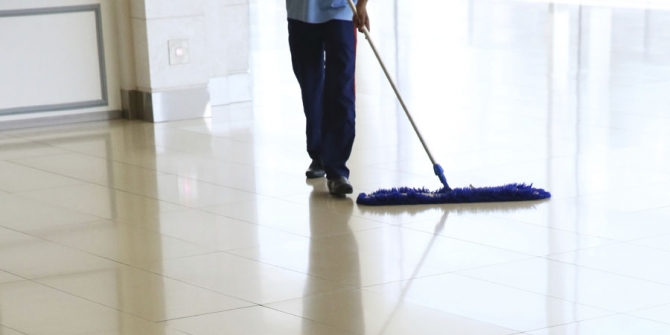Picture the scene: A huge warehouse building after dark; the day shift has packed up and gone home, the machines that spent the day whirring have ground to a halt and the lights have been dimmed to reduce overheads.
It’s not the opening scene of a TV thriller - it’s merely an example of a potentially daunting work setting that awaits hundreds, if not thousands, of cleaning staff every evening.
Almost 500,000 people work in the cleaning and support services industry in the UK and for work sites such as the one described, it is likely that a team of cleaners will be on shift at any one time. This is perhaps one of the reasons that the cleaning sector is under represented when it comes to lone worker protection. But just because there’s technically a team of people working on one site does not mean that every one of them is not still a lone or vulnerable worker.
Think about the situations cleaners often find themselves in and it is clear that there are a number of factors that make those working in the industry the dictionary definition of a lone worker, even if they - or their bosses - don’t realise it.
Whether it be working in warehouses and factories to hospitals, care homes, blocks of flats or office buildings, employees in the cleaning industry often find themselves working alone in large buildings at all hours of the day, most probably out of normal office hours in poor lighting conditions and with regular access to store rooms and basements with very little flow of people which could see them go undiscovered for a length of time in the event of an accident. Their isolation can open them up to the risk of attack whilst they are also vulnerable to a range of other risks such as slips and trips on wet floors and working with potentially hazardous chemical cleaning products.
Latest statistics reveal 8,333 incidents a year resulting in major injury and five deaths every year in the cleaning industry. But with numerous factors to contend with - including staff having to commute to several different locations during the day and night, a traditionally older workforce perhaps unfamiliar with latest technology and a higher percentage of non-English speaking staff than other industries - ensuring the safety of cleaning staff can prove difficult.
The list of situations workers in the cleaning industry can find themselves in is vast and varied which is why it is vital that any lone worker protection system is as versatile as the job role.
The LONEALERT service is used by cleaners for lone worker protection across the UK. It allows them to check in and out whenever they find themselves working alone and text-in messages can be set up in foreign languages to make it easier for staff to read instructions if necessary.
All employers should ask themselves the following questions to make sure their cleaning staff are safe in their jobs:
- Can you monitor all your cleaning staff easily?
- When did they start their shift?
- Where are the all now?
- What time did they finish yesterday?
- Can you find all of this information easily and quickly?
- Do all your cleaning staff speak fluent English?
- If they have an accident how long would it be before you’re notified?
- If there's a problem for a staff member travelling between cleaning jobs, would you be able to find them?
- If one of your workers has an accident, how long will it take before someone finds them?
LONEALERT’s lone worker protection can address all these issues so you know that every one of your cleaning staff is safe as they go about their work duties. It’s your responsibility - and it’s their right.

